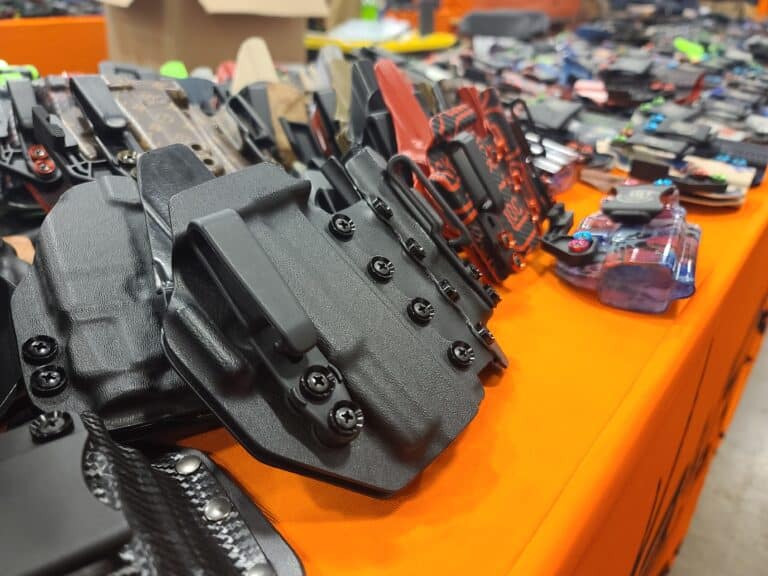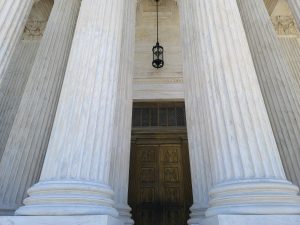With a new first-of-its-kind appeals court ruling, the most consistent streak in post-Bruen litigation has now been broken.
A unanimous three-judge panel for the Ninth Circuit Court of Appeals on Friday issued a split ruling on the constitutionality of both Hawaii and California’s so-called Bruen-response bills. In doing so, it upheld lower court injunctions against a handful of newly created “sensitive places” in each state but reversed several others. The ruling, for the first time ever, upheld a default ban on gun carry in publicly accessible private property, which severely limits where even licensed individuals can legally carry.
“In [Hawaii], we affirm the preliminary injunction with respect to financial institutions, parking lots adjacent to financial institutions, and parking lots shared by government buildings and non-governmental buildings,” Judge Susan Graber wrote for the panel in the combined cases of May v. Bonta, Carralero v. Bonta, and Wolford v. Lopez. “We otherwise reverse the preliminary injunction, thereby reversing the injunction with respect to bars and restaurants that serve alcohol; beaches, parks, and similar areas; parking areas adjacent to all of those places; and the new default rule prohibiting the carry of firearms onto private property without consent.”
Dubbed the “vampire rule” by its critics, this provision flips the traditional understanding of private property rights and gun carry on its head. Rather than allow lawful carriers to bring their guns onto publicly accessible private property by default unless the owner says no, as had been the case across the country to this point, these laws make the practice illegal by default unless a property owner provides explicit permission.
These provisions have been featured in the laws passed by states like New York, New Jersey, Hawaii, California, and Maryland aimed at undermining the Supreme Court’s recognition of a right to carry a firearm publicly for self-defense in 2022’s Bruen decision. Because they implicate virtually everywhere a concealed carry permit holder might take a gun outside the home, these provisions are by far the most consequential and controversial component of Bruen-response laws.
Due to their novelty and the scope of their impact on public carry rights, liberal and conservative-appointed judges alike have all blocked versions of the rule in the various legal challenges before now. Here’s a look at how the panel simultaneously upheld Hawaii’s version but left California’s version blocked.
Rahimi’s Impact
The panel decided to use a looser interpretation of the Bruen test because of the Supreme Court’s recent ruling in US v. Rahimi. Unlike most courts confronting all manner of Second Amendment cases in the aftermath of Rahimi, who have tended to either downplay its impact on Bruen‘s analysis or ignore it entirely, Judge Graber said Rahimi softened the test for gun laws.
“The Court’s analysis in Bruen misled some courts into imposing too rigid a test when considering historical sources,” Graber, a Bill Clinton appointee, wrote. “In Rahimi, the Court clarified that Bruen did not require stringent adherence to Founding-era laws, emphasizing that its ‘precedents were not meant to suggest a law trapped in amber.’”
“Rahimi therefore instructs that, even where historical analogues are not close matches to the challenged law, they may evince principles underpinning our Nation’s regulatory tradition, and it is sufficient for the government to show that its law is consistent with those principles,” she added.
She also drew a distinction between the level of stringency required in cases like Bruen, which dealt with the type of gun restriction that did not exist at the founding, and modern sensitive places laws, versions of which were in existence when the Second Amendment was ratified.
“We pause to note the difference between the ‘distinctly similar’ test applied in Bruen to New York’s law and the more lenient standard that applies when analyzing the regulation of firearms at ‘sensitive places,'” Graber wrote. “After all, only one or two colonial laws provided sufficient justification for the Court to designate several places as sensitive. The Court placed schools in this category, even though no law prohibited firearms in schools until more than thirty years after the ratification of the Second Amendment. By contrast, when Bruen applied the ‘distinctly similar’ test to New York’s proper-cause law, the Court’s analysis was more stringent.”
Therefore, she reasoned, the panel was permitted to treat a relatively small number of laws as a representative tradition for modern sensitive places bans, even though the Supreme Court had written piecemeal laws off as outliers in Bruen.
“The relevant tradition—regulation of firearms at sensitive places— existed at the Founding,” she wrote. “When examining whether a particular place falls within that tradition, a small number of laws, even localized laws, can suffice, if those laws were viewed as non-controversial.”
Historical Analysis of the “Vampire Rule”
In her historical analysis of the private property default ban, Judge Graber first drew a distinction between California’s version and Hawaii’s.
“Although the state statutes are similar, they differ in one key respect,” she wrote. “Hawaii’s law allows a property owner to consent orally, in writing, or by posting appropriate signage on site. California’s law, by contrast, allows a property owner to consent only by ‘clearly and conspicuously post[ing] a sign at the entrance of the building or on the premises indicating that licenseholders are permitted to carry firearms on the property.'”
She then surveyed the historical record and produced two laws she said represented an “established tradition” for the Vampire Rule: a 1771 New Jersey law prohibiting the carrying of firearms on any lands owned by another without “License or Permission in Writing” and an 1865 Louisiana law prohibiting “carry[ing] fire-arms on the premises or plantation of any citizen, without the consent of the owner or proprietor.”
While it isn’t clear if those laws were meant to apply to businesses open to the public like the modern private property provisions, Graber determined that they were historical “dead ringers” for the idea that governments have always been able to alter the default rules that apply to carrying guns on private property. However, she also held that, unlike Hawaii’s provision, California’s law fell outside this tradition due to its narrow requirement that property owners post signs of a particular size to grant permission to gun carriers.
“We find no historical support for that stringent limitation,” she wrote. “None of the laws forbade a person from obtaining permission only by convincing the owner to post signs of a specific size. Nor do modern circumstances appear to justify California’s imposing a much more stringent consent requirement; ordinary signs existed in 1791, in 1868, and today.”
Therefore, the panel reversed the lower court injunction against Hawaii’s Vampire provision while leaving the order blocking California’s intact.
Finally, Graber acknowledged the panel’s approval of Hawaii’s provision as an outlier among all the other courts to have reviewed de facto private property gun bans. She again pointed to Rahimi to help explain that discrepancy.
“We acknowledge that our primary holding—that a national tradition likely exists of prohibiting the carrying of firearms on private property without the owner’s oral or written consent—differs from the decisions by the Second Circuit and some district courts,” Graber wrote. “In reaching our limited conclusion, we carefully have examined the record in the Hawaii case and, to the extent that our decision conflicts with the analysis by other courts addressing the likelihood of success in those cases, we respectfully disagree with their preliminary, pre-Rahimi analyses.”
As a result, once the panel issues its order, virtually all publicly accessible property outside of banks and certain parking lots will be presumptively off-limits to gun carriers in Hawaii. Presumably, a similar situation could soon be true for California gun owners as well if the state’s legislature chooses to amend its law to remove the narrow language requiring signage.
Importantly, the opinion only deals with an interlocutory appeal and is therefore not likely to be the court’s final word on the matter. The gun-rights groups who filed these cases in Hawaii and California will undoubtedly keep fighting in court to reduce the number of “sensitive places” approved by the court.
But in the meantime, a panel of judges in the largest appellate circuit in the country has given early approval to a practice that functionally nullifies the Supreme Court’s recognition of a right to public gun carry.






